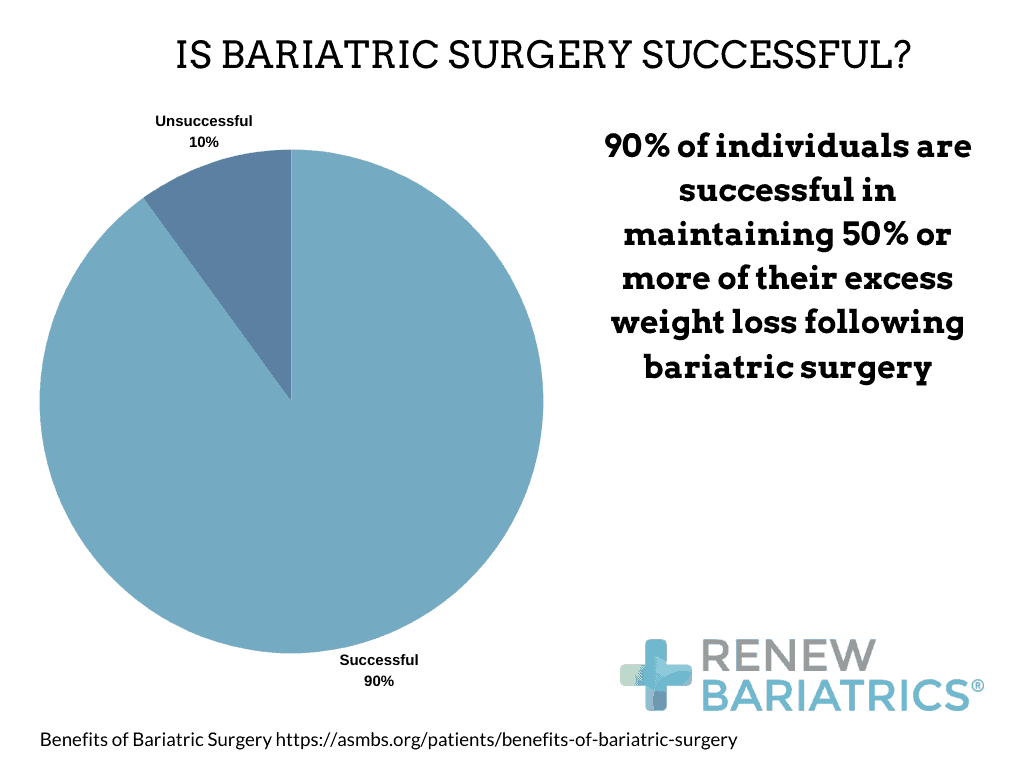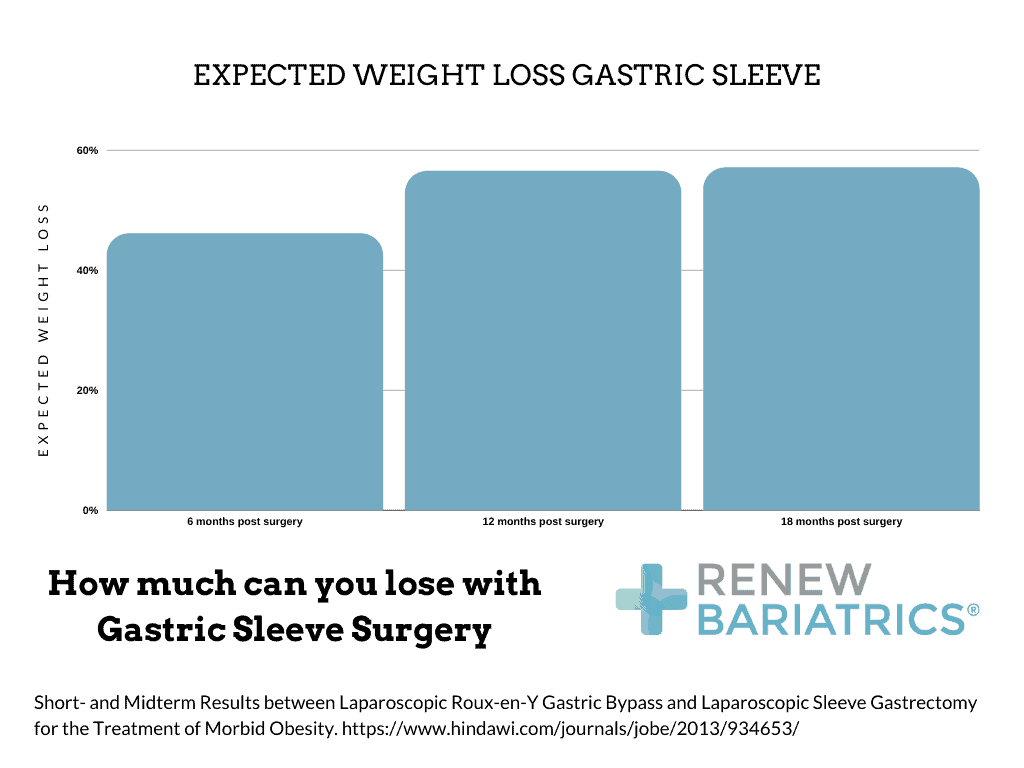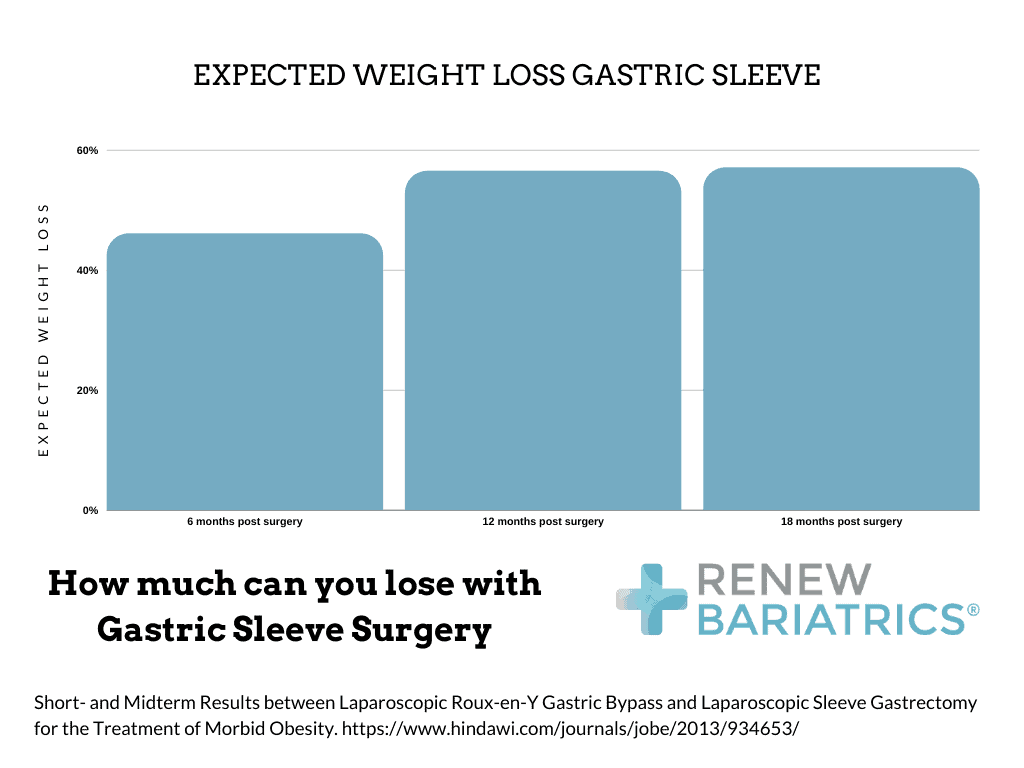
There are multiple bariatric surgeries to choose from, all of which you can expect to lose weight as a result. Many studies have demonstrated that more than 90% of individuals are successful in maintaining 50% or more of their excess weight loss following bariatric surgery.
Identifying weight loss expectations prior to surgery can eliminate future possible feelings of defeat and disappointment. This can save bariatric patients from believing that surgery, itself, will mitigate all of their health concerns. Or believing they will become the smallest physical version of themselves, instead of losing excess weight to become a healthier version of themself.
Weight loss is expected, but achieving the same BMI as one did 30 or 40 years ago, may not be attainable.
On average, patients can lose up to 70% of their excess weight upon having bariatric surgery. Which is a significant amount of weight loss.
Meaning, some patients will lose more than 70%of their excess weight and some patients will lose less.
The amount you lose can vary depending upon a number of different factors; age, health, starting weight, diet, exercise, lifestyle and of course willingness to commit to healthier choices practiced every day.
Patients will typically lose the most weight within the first 12-24 months. It is crucial that patients capitalize on this time period immediately after surgery, by following the post-op diet and discharge instructions.
Weight Loss is only one aspect of Bariatric Surgery Benefits
Think of bariatric surgery as one piece of the puzzle, combined with a comprehensive health plan to better achieve overall health and quality of life.
Bariatric surgery can help improve or resolve many obesity related diagnosis and health conditions such as; type 2 diabetes, hypertension, sleep apnea, high cholesterol and many more.
Due to the improvement of diseases and conditions, there is also a high reduction in mortality rates with bariatric surgery.
Immense weight loss through bariatric surgery can alleviate further health concerns; joint pain, infertility, depression and metabolic syndrome (Conditions like high blood pressure, high blood sugar, excess fat carried around the abdomen, high cholesterol, high triglycerides that can lead to heart attacks and strokes.)
In a Swedish study, determining long term outcomes after bariatric surgery, it was associated with a 29% reduction of mortality rate, a 72% reduction in type 2 diabetes after 2 years, and fewer cardiovascular events, as well as lower medication costs.
RYBG studied long term outcomes deemed a 40%reduction in all cause mortality and reductions in cardiovascular and diabetes related mortality. Not to mention greater improvements in quality of life compared to those who had not had surgery.
How to calculate your estimated weight loss after Bariatric Surgery?
First let’s start with defining Excess Weight. Excess weight is the weight one has the ability to lose through surgery, diet and exercise.
To calculate; Actual weight – Ideal weight = Excess weight.
Example; Actual weight is 300 lbs, Ideal weight is 200 lbs then the excess weight is 100lbs.
Estimated Excess Weight Loss per Bariatric Surgery
Total
Gastric Bypass = 70%
Gastric Band = 49%
Gastric Balloon = 32%
Using that same example; starting weight is 300 lbs and the excess weight is 100 lbs then 65% of 100 pounds is 65 lbs. On average, a patient with those stats can expect to lose 65 pounds.
Use our BMI Calculator and Bariatric Surgery Weight Loss Estimator Tool to Estimate your Weight Loss.
These calculations are based on the average weight loss surgery outcomes. Additional weight loss can be achieved with further pursuit of diet and exercise long term.
The chart below displays possible weight lost over the first 18 months with post Gastric Sleeve surgery.

*Notice that patients who have increased weight to lose, have the ability to lose more weight, vs patients who have a lower start weight. Although the percentages of weight loss stay the same.
| Timeline Post Surgery | Gastric Bypass; Excess Weight Loss % | Gastric Sleeve; Excess Weight Loss % |
| 6 months post surgery | 55.9% | 46.1% |
| 12 months post surgery | 72.3% | 56.5% |
| 18 months post surgery | 77.6% | 57.1% |
On average patients can look forward to losing weight over a period of 18 months:
3 months = up to 33% excess weight
6 months = up to 50 % excess weight
12 months = up to 65% excess weight
18 months = up to 70 % excess weight
Once identified how much weight can potentially be lost, patients are then able to create a realistic idea of what is possible, and what life may look like after surgery.
On a positive side note, any weight loss has been shown to benefit overall health, in obese patients.
Whether a patient is able to lose 67% of their excess weight vs 39% of their excess weight. Even 10% weight loss has significant value in benefiting overall health. Many Bariatric patients can reverse diagnosis or health conditions, reduce or eliminate obesity related medications, become more active further creating a healthy lifestyle, through weight loss.
Ideal Weight after Bariatric Surgery
It is a personal choice to identify a specific goal weight. Although to be clear, patients do not need to have a goal weight in mind. Patients can rather choose a dress size they’d like to get to, or even lose weight to “feel” better.
Many patients choose to go into the process with a goal weight already chosen. Be sure to set a realistic number. A weight that is achievable, as well as manageable. Before deciding on a “goal weight”, understand by doing so, you are developing a strict method to identify success.
Meaning the number on the scale vs. recognizing positive changes, health and fitness accomplishments and improving relationships with food, nutrition and one’s own body.
There can be many pressures to choose an unrealistic goal weight. Keep in mind, a weight you once weighed, years ago, may not be obtainable. Additionally do not compare yourself to the BMI chart or other people when choosing your personal “Ideal” weight.
If you would like to set a goal weight, also consider the many reasons why you choose bariatric surgery, in the first place.
- Reduce or Eliminate Medications
- Reverse Medical Diagnosis
- Become More Mobile and Flexible
- Extend Life/ Quality of Life
- Smaller Dress Sizes
- Travel More Comfortably
- Become More Physically Active
- Role Model to Family and Friends
- Take Control of Health and Wellbeing
If a goal weight is chosen, it should be based on the individual’s health and physical capabilities. Don’t let anyone or anything interfere or impact the decision.
Lifestyle Adjustments
After bariatric surgery patients will need to dramatically change their lifestyle to ensure weight loss is maintained and further prevent weight regain in the future.
It is crucial that patients use the time, immediately after surgery to radically change their relationship with food. Patients also need to educate themselves on nutrition, portion control and sharpen their cooking skills.
Patients who successfully adjust their entire lifestyle will benefit long term.
The implementation of eating healthy, portion controlled meals and becoming more active, will help prevent old habits from coming back. It will also reinforce continued weight loss.
Remember bariatric surgery is a tool to be used. It can drastically help eating habits shift, as long as there is action behind it.


